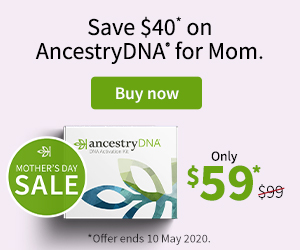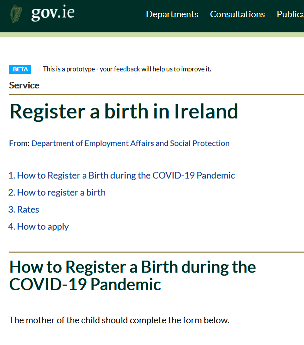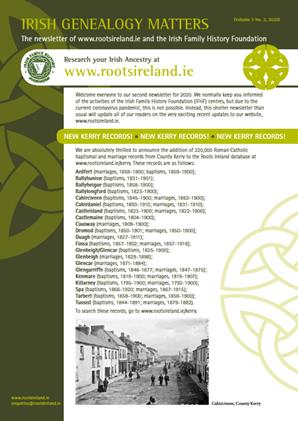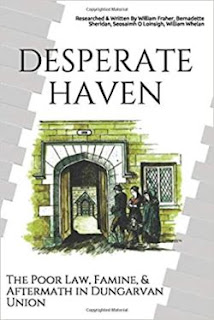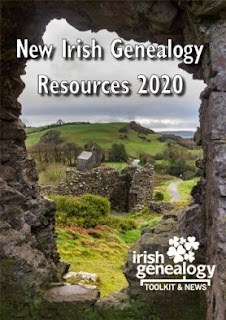My regular summaries are designed to help family historians whose Irish ancestors emigrated, temporarily or permanently, to the United States. By default, they should also be useful to anyone carrying out research in the US, regardless of the origin of their ancestors.
The figures in parenthesis in the New Collections section are the numbers of records/images in each new record set. Please note that I have omitted updates of fewer than 1,000 records to any one record-set.
Unless otherwise stated, the figures in parenthesis in the Updated Collections section reflect the number of records added to the collection in the recent update, if a number has been clearly noted by the supplier.
NEW COLLECTIONS
Ancestry
- Pennsylvania, Grand Army of the Republic Membership Records, 1865-1936 (14,100)
- Web: Washington, Various County Census Records, 1850-1914 (769,198)
- Alabama, Episcopal Diocese of Alabama, Church Records, 1837-1970 (34,930)
- Web: Minnesota, St. Louis County, Marriage Index, 1871-1894 (9,752)
- Web: St. Louis County, Minnesota, Death Index, 1870-1899 (244,450)
- Web: St. Louis County, Minnesota Birth Index, 1870-1900 (16,595)
- Web: Minnesota, Marriages from the Minnesota Official System, 1850-2019 (5,690,171)
FamilySearch.org
- Idaho, Twin Falls Co. Sunset Memorial Park Cemetery, 1937-1993 (14,733)
- Michigan, Grand Army of the Republic (GAR), Cemetery Index, 1799-1999 (12,885)
- California, San Francisco Crew Manifests, 1896-1921 (2,589)
- Georgia, Savannah Passenger Lists, 1906-1945 (3,742)
- Massachusetts, Gloucester Passenger and Crew Lists, 1906-1943 (24,147)
- Massachusetts, Passengers Arriving Boston, Index, 1921-1949 (262,878)
- New Jersey, Newark, Mount Olivet Cemetery, 1871-1984 (3,320)
- New Jersey, Gloucester Co., Clarksboro, Eglington Cemetery, 1880-1983 (2,338)
- Virginia, Southern Claims Commission Approved Claims, 1871-1880 (5,493)
- USA, California, Certificates Surrendered at San Francisco from Aliens Previously at Honolulu, Hawaii, 1912-1946 (23,125)
Newspapers.com
- Sacramento Bee, 1857-2020 (4.8million pages)
UPDATED COLLECTIONS
AmericanAncestors
- Massachusetts: Roman Catholic Archdiocese of Boston Records, 1789-1920
- St. Lawrence O’Toole in Lawrence
- All Saints (Roxbury) 1896-1908
- Sacred Heart (Weymouth) Marriages, 1870-1892
- Madison, CT: Church Records, 1791-1827 (No additional records. Images uploaded)
Ancestry
- USA Public Records Index, 1950-1993, Volume 1 (418,684,440)
- Tennessee, Death Records, 1908-1965 (4,888,623)
- New York, Grand Army of the Republic Records, 1866-1931 (25,592)
- North Dakota, Marriage Records, 1872-2017 (242,178)
FamilySearch
- California, County Birth and Death Records, 1800-1994 (7,591)
- California, Los Angeles, Angelus-Rosedale Cem/Crem, 1884-2002 (1,946)
- California, San Benito Co. Registrar, Burial Permits 1911-1948 (1,116)
- California, San Mateo Co., Colma, Italian Cemetery, 1899-2011 (7,473)
- Georgia, Chatham, Savannah, Laurel Grove Cemetery, 1852-1942 (5,145)
- Hawaii, Births and Baptisms, 1843-1909 (3,389)
- Iowa, Marshall Co., Marshalltown, Riverside Cemetery, ca.1800-ca.1975 (21,426)
- Louisiana, Orleans Parish Death Records & Certificates, 1835-1954 (74,297)
- Maryland, Baltimore Passenger Lists Index, 1897-1952 (142,707)
- Mississippi, Death Certificate Index, 1912-1943 (14,348)
- Nebraska, Lancaster County, Wyuka Cemetery Burial Permits, 1883-1999 (15,663)
- New Jersey, Newark, Mount Oliver, 1871-1984 (28,918)
- North Carolina, CHS, Vital Records Unit, County Births, 1913-1922 (18,429)
- Ohio, Cincinnati, Vine Street Hill Cemetery Index of Burials, 1851-1986 (3,360)
- Pennsylvania Mortality Schedules, 1850-1880 (95,281)
- Rhode Island, Providence, Swan Point Cem., ca.1846-ca.1950 (1,121)
- South Dakota, Grave Registration Records, 1940-1941 (3,031)
- USA Rosters of Revolutionary War Soldiers & Sailors, 1775-1783 (139,060)
- USA Deceased Physician File (AMA), 1864-1968 (112,140)
- USA, GenealogyBank Historical Newspaper Obituaries, 1815-2011 (1,997,916)
- Utah, Brigham City FHC, Obituary Collection, 1930-2015 (13,581)
- Virginia, Bureau of Vital Statistics, County Marriages 1853-1935 (13,081)
- Vermont Vital Records, 1760-1954 (1,911)
FindMyPast
- United States Billion Graves Index (2.2million additions)
MyHeritage
- US Year Books, 1890–1979. Photos have been colourized.
Some of the above content contains affiliate links. This means I may earn a small commission if you buy via these links. This does not affect the price you pay as a consumer, but it does contribute to keeping Irish Genealogy News online. See Advertising Disclosure tab above.





